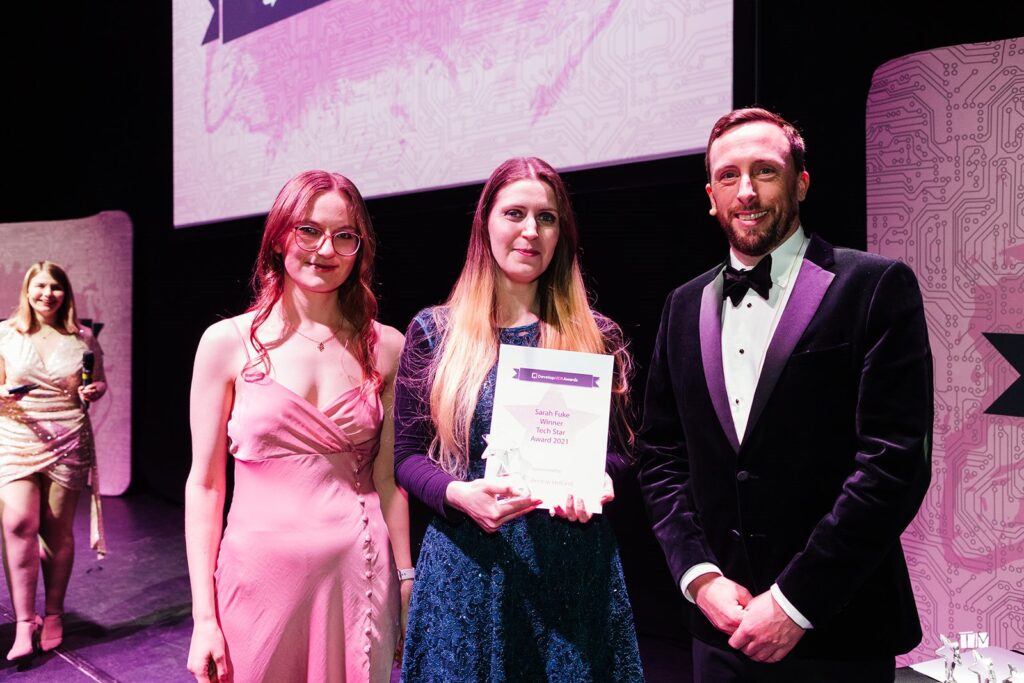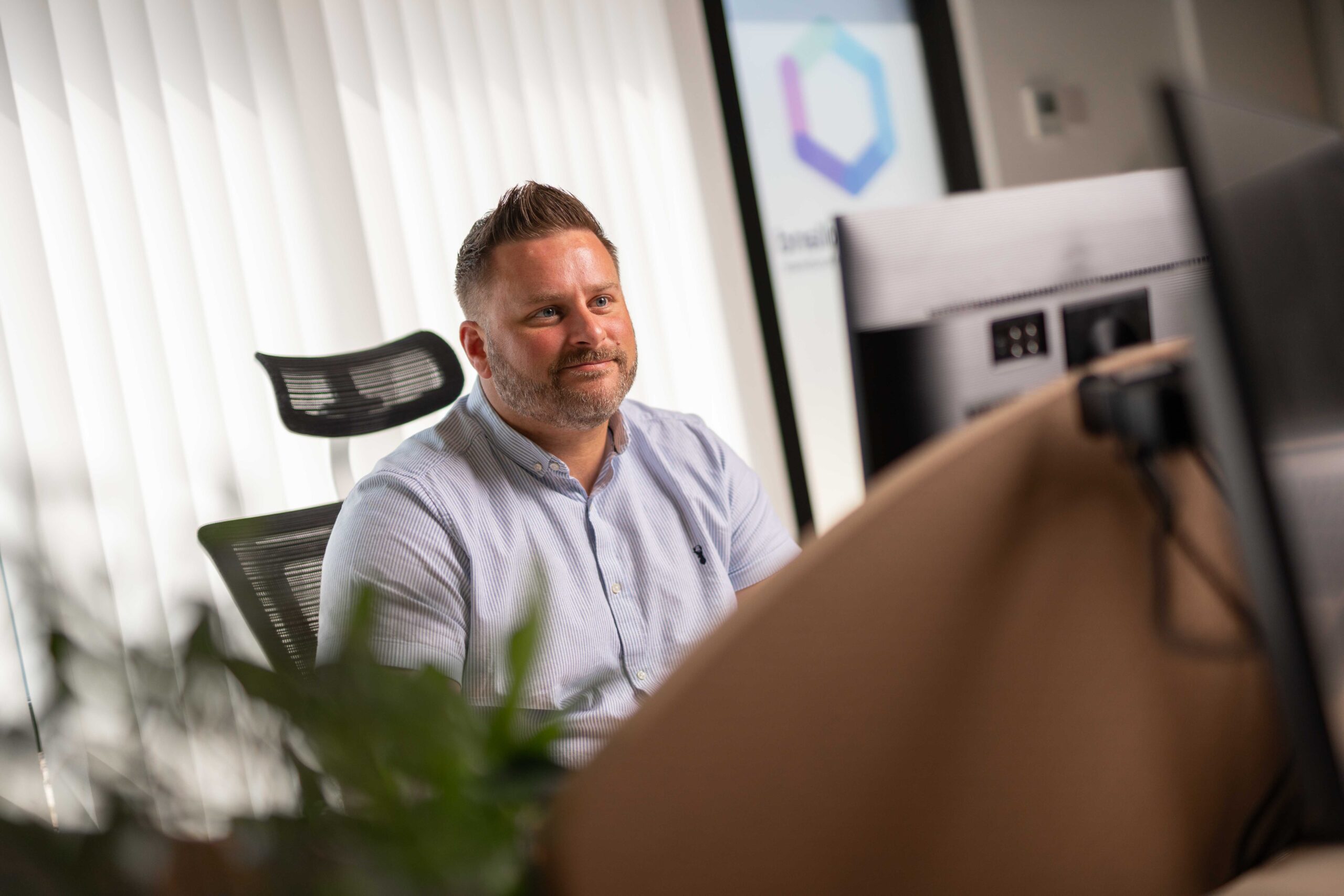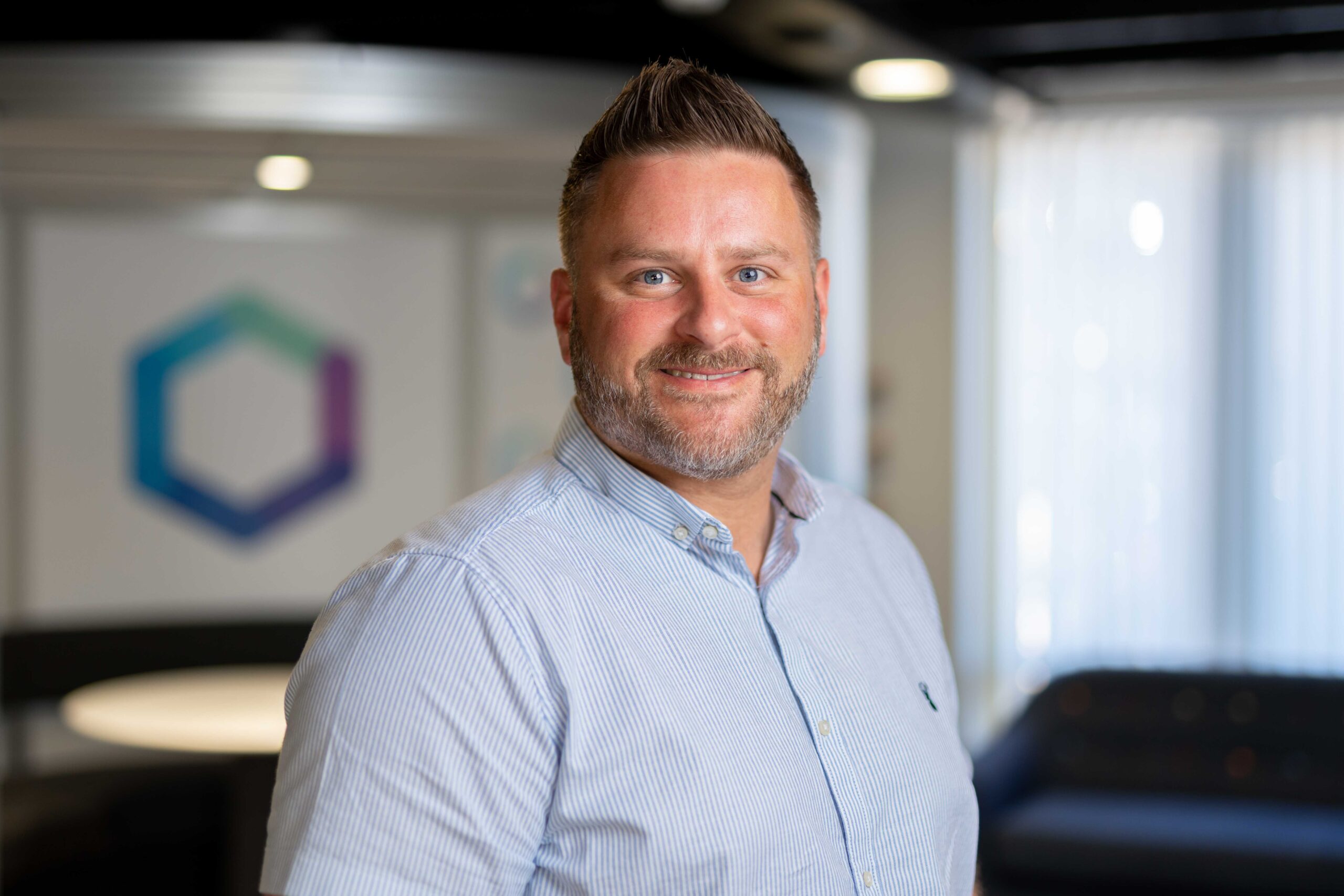‘It’s like I’m in on a big secret and trying to share it with everyone!’
Vickie Allen’s star shines very bright in the East Anglian technology sector. Senior Developer at FinTech pioneers Certua and co-founder...
Vickie Allen’s star shines very bright in the East Anglian technology sector. Senior Developer at FinTech pioneers Certua and co-founder of the DevelopHER Awards, she’s established herself as a key player in the fight to raise the profile of women in tech and present role models for those looking to progress in the industry.
We caught a few valuable moments with Vickie to talk about her experience as a woman in the tech industry, how she sees the landscape developing for women in our sector and her plans for the next DevelopHER Awards.
How do you feel as a woman in the tech industry?
I think this comes back to why I run the DevelopHER Awards, but I feel like I’m in on some kind of secret.
The stereotype is that tech is some kind of boys’ club and women think they can’t do it, or that they’re not capable of doing it. But it really is an awesome industry to work in. There’s all this opportunity and I really don’t think it should be like a boys-only club.
So I’d say I’m in on the secret and just trying to share it with everyone. But everyone just doesn’t believe me!
What sparked your interest in tech originally?
I guess I was one of the first generations to grow up with tech from quite a young age. There’s a photo of me as a baby sitting in front of a BBC B computer. My dad worked in IT, so I suppose that helped a bit, although I do famously remember my mum telling me not to take IT for A level because I couldn’t possibly want to go into IT like my dad. I think she’d seen my dad get stressed out by his job and didn’t want the same for me.
So, naturally, as any teenager would, I did exactly the opposite of what mum told me to do! But I would also say that me and my dad have very different jobs. He was involved with project management from early on rather than the development side.
What inspired your move into development in particular?
I couldn’t put my finger on it exactly, but it was probably when I was around 13 and MySpace was a thing. You could edit your profile page and add CSS and HTML, edit your theme and change the font and so on, and I guess that was my first dabble with code. Not that I realised it at the time. I just thought I was adding pretty things to my page.
For me it was just a means to an end, a way of seeing there is more than one way to do things. Not a matter of right or wrong, just what works and doesn’t.
As your career progressed, did you get any great advice?
My favourite quote – and I use this one way too much – is:
‘Bite off more than you can chew. And then chew like hell.’
For me, that is how I deal with change. I think that you can work through it, push yourself. And yes, I try to live like that and make sure I don’t get stuck in the same rut. Always pushing myself.
You started the DevelopHER Awards in 2015. How did that come about?
When I started working in the industry at the end of 2012, someone invited me along to a tech meetup. They had a speaker from Google, so for Norwich it was quite a big event. There were around 80 people there and when I walked in the room there must have been maybe three other women. I was, like, ‘What??’
I guess I had been sheltered from this whole issue of the number of women in IT up to that point. At school, we actually had a woman as head of IT, and there were a couple of women teachers, so I was none the wiser that this was unusual.
I was really shocked the industry was like this. So I started running meetups and getting female speakers in and getting people to come along, but it wasn’t really doing it for me. And then someone said, ‘Oh, you should run an awards ceremony.’ I’m not very good at saying no, so I said, ‘Sure, let’s do it!’
I do really like the impact the event has. I think of it like a snowball effect because you can nominate someone and then they know about the Awards, and then they nominate someone, and they nominate someone else, and it just grows out from there. It’s not limited to the same circle, which is what I found with meetups.
And no-one can say no to an award, can they?

How would you say DevelopHER has evolved since you first kicked off?
I wouldn’t say it’s changed that much, really. It’s grown a little bit. The first year we had around 150 people and now we have more like 200-250.
We’ve also made it a bit fancier and gone for the full black tie. In the tech industry, we don’t get to dress up enough and it gives me an excuse to buy a fancy dress. I think people resonate with this as well – I’ve had several say to me they can’t remember the last time they had to dress up to go out. It makes it a lovely celebration.
The last one, last November, was just before the Omicron variant came about, so people were starting to relax and think all the isolation was over. For so many people the awards was the first event where they’d actually seen each other. It had a very special atmosphere, different from all the other years, you could just feel people reconnecting. It was wonderful. I was so grateful it was before the Covid precautions came back again the next week, because it wouldn’t have been the same kind of event a week later.
How would you say the tech career landscape has changed for women in the last 10-20 years?
I would say that in my experience I do think there are more women in tech, but not necessarily in my role, as a developer. We’re constantly hiring and we never get any women applying, and it really frustrates me. It’s a problem.
But I would also say that in sectors like digital marketing there has been an increase in women taking those roles. And they’re actually doing more techy stuff than they realise. It’s kind of in disguise.
This is one of the reasons why we have such wide categories with the Awards. Because a lot of people think that women in tech is just about sitting in front of a screen, writing code. What the Awards aim to show is that it’s so much wider than that. If you are a woman working for a tech company doing digital marketing, or in any role, that makes you a woman in tech. I do think people are scared of the words ‘tech’ or ‘IT’, and they shouldn’t be.
“I would hope that in 10 years maybe there wouldn’t be any need for the DevelopHER Awards because women in tech would no longer be unusual.”
Do you have any female heroes in the tech/IT sector?
I don’t think I do, and I think that’s part of why I wanted to run the Awards. There’s that quote, which goes something like: ‘You can’t be something you can’t see.’ So it’s all about creating those role models for other people to see.
I wouldn’t say I’m the kind of person who is into celebrities or particular people, personally. But I do think it’s important to create those role models.
This said, locally, you’ve got people like Sam Parnell in Ipswich who is always out there shouting about everything. In Cambridge there’s a developer called Sofia Price who’s really technical – I’ve always followed what she does.
There’s also a woman called Tricia Gee who was really involved in Java and JetBrains. At the beginning of my career she came along to a lot of meetups, and I guess I was inspired by her and the work she’d done.
What are you excited about for the future?
I’m excited to see, and encourage over time, more women in tech. Part of me feels that, surely, because of all the work that’s been and being done across the country, some of that must have an impact and we’ll see more girls coming into tech career paths. They’ve properly grown up with technology. Since day one, they’ve been using phones and iPads. Surely, tech has been built into their minds and they’ll like the idea of following a career path into that world.
I’m just hopeful that we’re going to see the balance shift. I would hope that in 10 years maybe there wouldn’t be any need for the DevelopHER Awards because women in tech would no longer be unusual.
Do you think the climate in recruitment has evolved to accommodate the needs of women in tech?
I do still think there is an issue – and this is in any industry – where men will apply for a job if they meet 50% of the criteria, whereas women apply if they meet 99%. I think that has an impact, especially for a more technical job like mine. The employer might be listing all these technologies they use, and the chances of someone’s tech stack matching those requirements 100% is slim.
If you’re changing jobs, there are always going to be parts of that job you don’t know and will need to pick up. But also, tech is always evolving and you’re always learning. Every time I look at a job description, I think, ‘I can’t do all of that’, and then think: ‘No, if I was a man I would be applying for this.’ You need to be confident and just do it. The worst they can say is no.
People sometimes ask me if I can help them write a job description so they can get more women interested, but I do think it’s very subjective. What might work for me might not work for another woman. So, unfortunately I don’t have a magic wand to wave and suddenly they’ll get all these women applying for their jobs. We can’t even get women applying for the jobs where I work!
There’s a wider problem. There’s a shortage of developers in general, and beyond that there’s an even greater shortage of women in tech. We’ve already got two women developers, so I’d feel a bit greedy getting another one!
After the pandemic, there has been more flexible work available in tech. I do think tech is one of the industries that has changed to flexible working practices and won’t change back. This can perhaps help attract some of the people who’ve been looking for that flexible environment, which stereotypically could be women, but obviously not all of them.
Is there a typical route for women into tech?
What I sometimes talk about is how I didn’t go to university. People often think that this is the only route you can go down into a development role, and I don’t think that’s true. You can teach yourself in this field. Obviously, I was lucky to have the opportunities I did, but I do think that if you just wanted to start learning at home in your spare time, you can. There are plenty of resources out there to do that, and people shouldn’t be scared of going for it.
Through doing the Awards, I’ve heard quite a few success stories of people who were working in non-technical roles who found an interest in more technical aspects and then side-stepped into it. I think most companies – especially since it is so hard to recruit developers – if they’ve got someone showing interest they will welcome them into the fold, so to speak.
Also, everyone seems to think you have to be really good at Maths to be a developer, and I also don’t think that’s true. Don’t get me wrong – I did enjoy Maths at school, so perhaps I fit that stereotype and I do enjoy lots of logical type stuff, but I wouldn’t say I really use Maths in my job.
People sometimes have this image of you writing lots of crazy, complicated algorithms and I think the job is made out to be amazingly complex. This goes back to what I said earlier, about it being a secret. Sometimes I feel like people want others to think being a developer is a crazily difficult job to make themselves feel good about it. I personally think that you don’t have to be really, really clever to be a developer or to work in tech. But it sometimes gets put on this pedestal.
Do you think this is a common block – assuming you need to be ultra clever or great at Maths to get into development?
I actually went out to a local high school a few years ago to talk to a class who were choosing their GCSE options and they had to choose between Computing – which was the more complicated option – or IT. And the teacher stood there in front of me and said, ‘If you don’t like Maths you should do IT, and if you like Maths you should do Computing.’
I had to say, ‘Can we not base this on whether we like Maths or not?’ because I’m not sure that any teenage girl is ever going to admit to liking Maths.
Is there still that differentiation at school age about what women or men should go into?
I wouldn’t say that there was at my school, but then at that time there was just one subject: IT. Since they split the curriculum into Computing and IT, and kids have that choice, I think many will choose IT and immediately they will be on the back foot when it comes to development.
I think people should have to do both, just as I had no choice but to do IT when I was at school. I think we need to say: tech is the future. Tech is in everything you touch nowadays. By the time you’ve got up in the morning and gone to school, you’ve already touched about 30 things that are controlled by some kind of code. We don’t let kids not do Maths – you have to have an understanding of it – and I think the same should be true of computing.
So this all still relates back to you feeling like you’re in on a big secret that everyone should know?
I love my job and I can’t imagine doing anything else. And I want to share this. I hear people moaning about their job and I think: ‘Come and do my job!’ I hear people say, ‘Oh, I couldn’t possibly do your job.’ And I think, ‘But you could, though!’
Finally, when will the next DevelopHER Awards take place?
The provisional date is November 24th, and we’ll be back in Norwich. We’re using a venue we haven’t used before, Epic TV Studios. Sadly we couldn’t use the Open venue again as it closed during the pandemic, but Epic will hopefully live up to its name.








